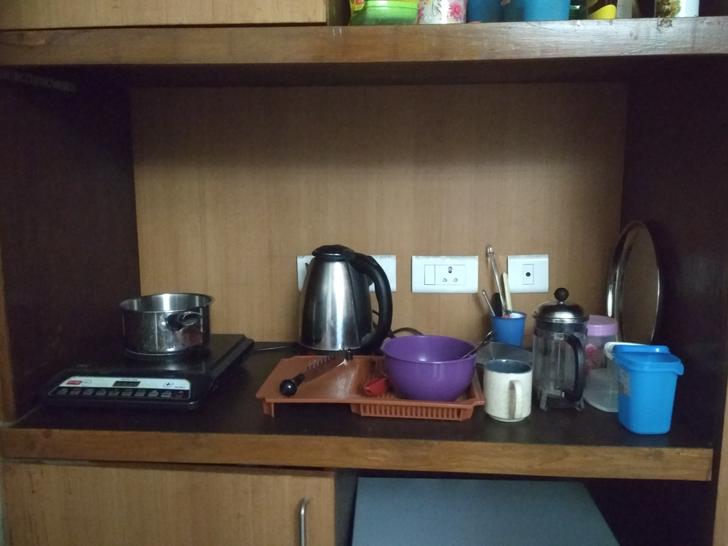First off, if you're living in a dorm room then you've signed a contract saying what you are and aren't allowed to do in that dorm room. Read it. It's very likely that it will include cooking as something you aren't allowed to do, and cooking appliances as something you aren't allowed to own whilst living in that room. The risk of fire from cooking appliances is very real, and if something catches then it can be very hard to put out, especially in larger buildings. (In the UK, Grenfell Tower is still very much on everyone's minds.)
Dorms also usually have cleaners who come in to vacuum/mop the floors regularly, and they'll report something like that to the uni authorities. That'll result in an immediate warning, and being kicked out of the dorm if you don't sort it straight away.
If you don't have a cleaner, and won't get found out immediately... When I was at uni, they had compulsory inspections of every dorm room every term. If they thought it wasn't tidy or clean enough, you had to sort it, or pay for professional cleaning if it was beyond what would normally be expected. If you'd caused any damage, you had to pay for repairs.
So you can reasonably expect your first room inspection to land you in very serious trouble. Sauteeing produces grease fumes which congeal on the walls and ceiling. Steaming/boiling produces water vapour which condenses on the walls and ceiling. This may not only damage the veneer on the "wood" surfaces, but may also damage the drywall walls and ceiling. Kitchens, bathrooms and similar areas use (or should use) drywall and paint which is resistant to water and grease, and which can be cleaned. Regular domestic drywall and paint will not, and cleaning will damage them too. It's perfectly possible that your cooking could land you with a bill for renovating the entire room which involves taking it back to bare concrete/studs and entirely rebuilding. If you're lucky, that bill will "only" be in single-digit thousands, but it could easily be more.
If you don't have regular room inspections, and won't get found out within a few months... You can absolutely guarantee that every surface in your room will be damaged, and there is no way around it. So you'll definitely be faced with that bill. Most universities will not award a degree to anyone who still owes the university money, so if you can't pay up then you've lost your PhD at the end of all this.
TL;DR - just don't.

